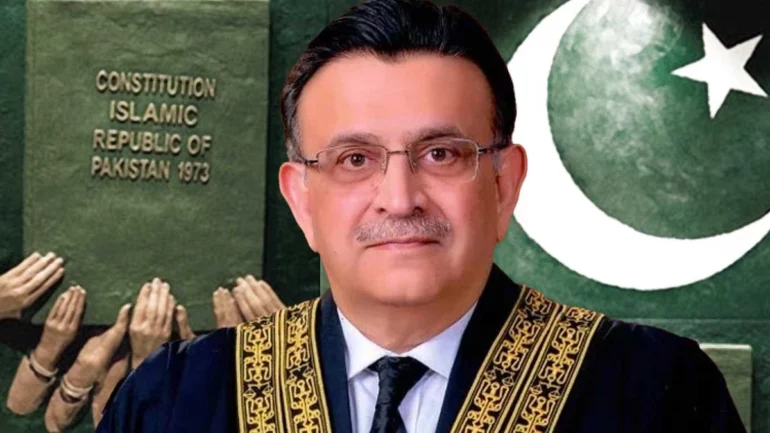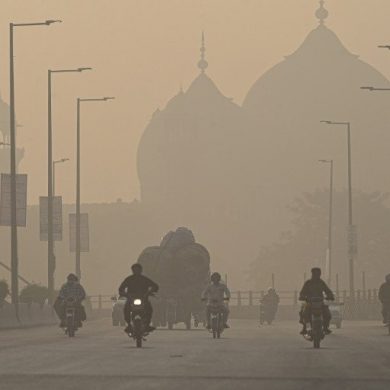A larger bench of the Supreme Court was formed to hear petitions on a bill passed by a joint sitting of Parliament to limit the power of the Chief Justice of Pakistan regarding suo motu notices and constitution of benches.
According to media reports, an eight-member larger bench, led by Chief Justice of Pakistan Justice Umar Ata Bandial, will hear petitions against the Supreme Court (Practice and Procedure) Bill on April 13.
The bench included Justice Ijazul Ahsan, Justice Muneeb Akhtar, Justice Mazahir Naqvi, Justice Muhammad Ali Mazahar Naqvi, Justice Ayesha Malik, Justice Hasan Azhar Rizvi, and Justice Shahid Waheed. The judges who recently wrote dissenting notes are not part of the larger bench.
The bill was challenged in the apex court on Tuesday. One of the petition, filed by Advocate Muhammad Shafay Munir, claimed that the bill should be declared illegal and unconstitutional as only the top court had the authority to make its own rules. The petition made the federation of Pakistan through its secretary and the minister for law and justice as respondents among others.
Munir filed a Constitutional petition under Article 184(3) to “safeguard the Constitution and independence of [the] judiciary as safeguarded and fully secured in the preamble of the Constitution”.
The petition stated that during the proceedings of the Supreme Court’s suo motu hearing regarding the delay in Punjab polls, “the federal government along with PDM started a vicious campaign in general public and media to undermine the reputation and credibility of honourable judges” of the SC, “especially” the CJP.
It continued that with its “agenda”, the incumbent government through the Ministry of Law proposed a bill for the curtailment of powers of the CJP in a “hurry without adopting the due course of law and in violation of Article 70 (1 and 4) of the Constitution”.
It stated that the bill was presented to the president for his assent but was sent for reconsideration by Alvi because it “was against the above-said Constitutional provisions”.
“Again, without taking into consideration and discussions on the objections by the president on [the] bill in question, the Parliament again in a hurry and without adopting the due course of law, beyond [the] powers of the Parliament, passed the bill on April 10 in a joint session”.
The petition contended that the Constitution had made it clear that the “independence of the judiciary” should be fully secured and the “Parliament has no powers to pass such an act to curtail the powers of [the] Supreme Court or its chief justice or the judges”.
It maintained that the president had “highlighted the aspects” that required reconsideration, but the Parliament failed to reconsider the same and passed the bill beyond its powers.
Outlining its grounds, the petition said that Article 191 of the Constitution stated that “subject to the Constitution and law, the Supreme Court may make rules regulating the practice and procedure of the court”.
It continued that the powers to make SC rules were “expressly entrusted” to the court itself and not to the Parliament.
Therefore, it stated, the Parliament did not have the powers to “enact any sort of legislation in relation to the powers and procedures of the Supreme Court”.
Citing the Fourth Schedule given under Article 70(4) of the Federal Legislative List’s item No55, the petition maintained that the Parliament only possessed powers in relation to the enlargement of the jurisdiction of the SC, but not to curtail its powers.
According to the petition, the SC while exercising powers under Article 191 of the Constitution, has already framed rules regulating its procedure and practice, and “Order X1 of Supreme Court Rules 1980 provides Constitution of Benches, and this power lies with the” CJP and these powers could not be curtailed through an act of the Parliament being beyond its jurisdiction and areas of enactment.
“The Supreme Court is established, empowered and regulated by the Constitutional Provisions given in articles 176 to 191, but not by any other law made by the Parliament and it is fully secured in the preamble, hence, if any curtailment of powers of the Supreme Court or its Chief Justice is required to be made, it could only be made through the Constitutional Amendments with two Third Majority but not by single majority by way of passing [the] bill in an ordinary manner”.
The petition prayed that the top court accepts the petition and declare the “impugned” bill as “ultra vires and unconstitutional and of no legal effect”.



